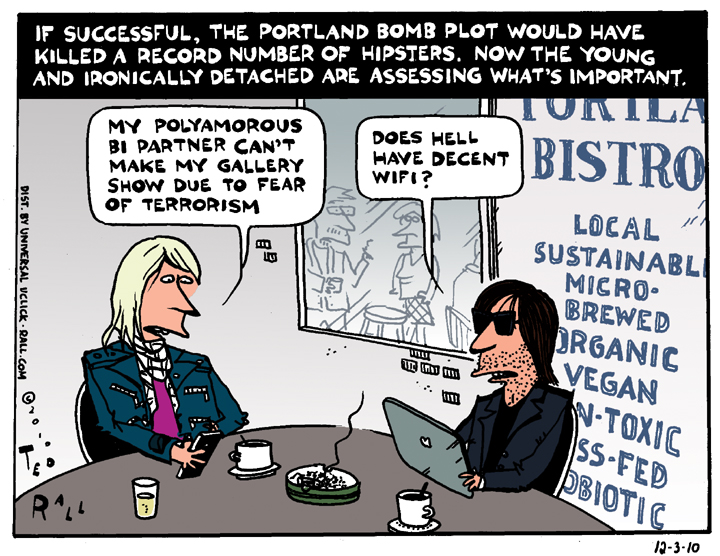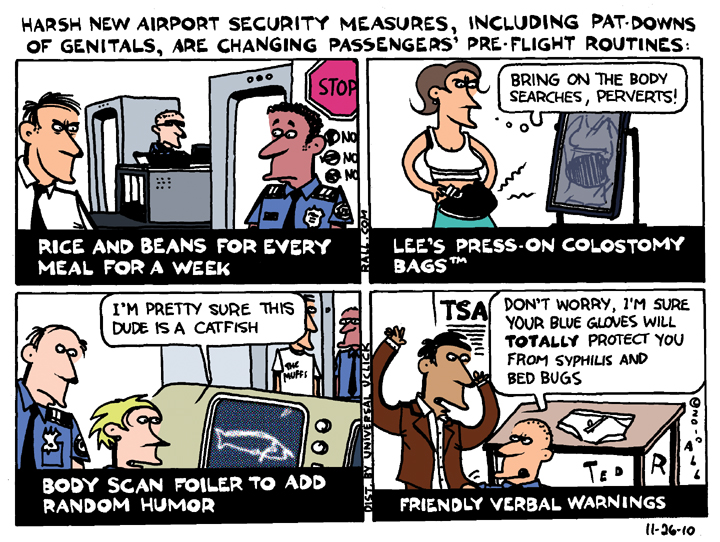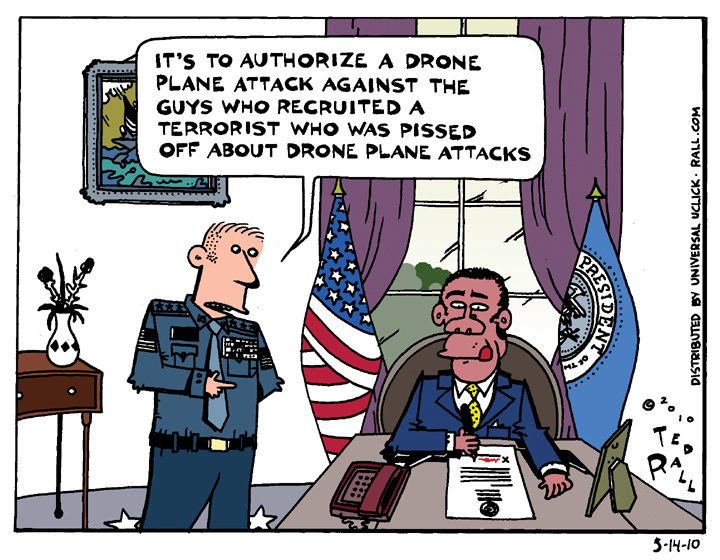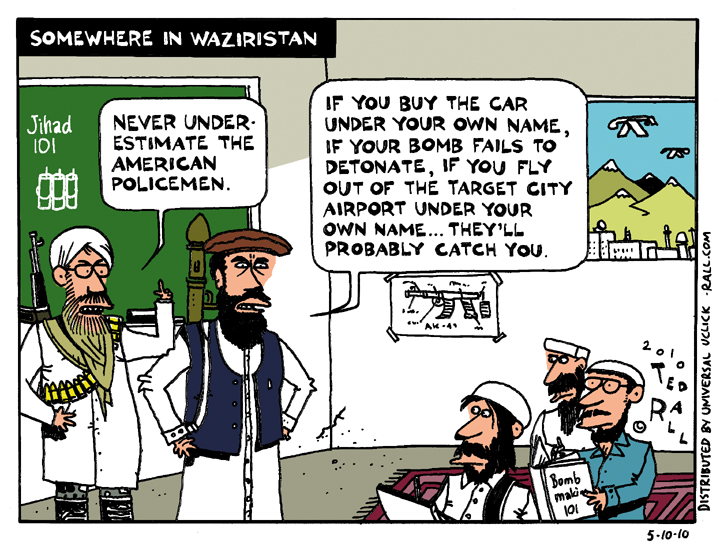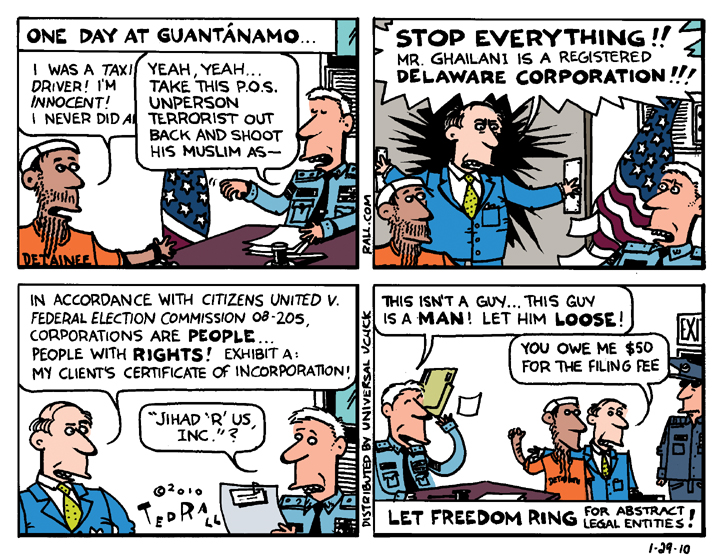Now that BIn Laden is dead, when do we go after the real terrorists?
SYNDICATED COLUMN: What If Might Made Right?
Reimagining the Assassination of Bin Laden
President Obama murdered Osama bin Laden. I am surprised that the left has been so supportive—not of the end result, but of the way it was carried out.
Imagine if the killing had gone down the same exact way, but under Bush. Armed commandos invade a foreign country, storm into a suburban neighborhood, blow a hole in a house and blow away an unarmed man in front of his 12-year-old daughter. The guy is a murder suspect. Mass murder. But there’s no attempt to arrest him or bring him to justice. They spirit his bloody corpse out of the country and dump it into the ocean.
Osama bin Laden was suspected ordering of one of the most horrific crimes of the decade. He might have been taken alive. Yet Obama’s commandos killed him. A big part of the puzzle—the key to the truth, who might have led us to other people responsible for 9/11—is gone.
Barack Obama is our Jack Ruby.
Liberals would be appalled if this had happened four years ago. They would have protested Bush’s violations of international law and basic human rights. They would have complained about killing the Al Qaeda leader before questioning him about possible terrorist plots. They would have demanded investigations.
But this happened under Obama. Which means that even liberal lawyers who ought to (and probably do) know better are going along. At a panel discussion at the Justice Institute at Pace Law School, University of Houston law professor Jordan Paust asserted: “You can [legally] use military force without consent in foreign countries.”
“At some point a sovereign state [such as Pakistan] that’s harboring an international fugitive loses the right to assert sovereignty,” added Robert Van Lierop.
Paust and Van Lierop are, respectively, a leading opponent of torture at Guantánamo and a former UN ambassador known for his activism on climate change. Both are “liberal.”
In the U.S., conservatives and “liberals” agree: Might makes right. America’s military-intelligence apparatus is so fearsome that it can deploy its soldiers and agents without fear of retribution.
Might makes right.
In 2007, for example, U.S. Special Forces invaded Iran from U.S.-occupied Iraq in order to kidnap Iranian border guards. It was an outrage. In practical terms, however, there was nothing the Iranians could do about it.
The United States’ 900-pound gorilla act might go over better if we weren’t a nation that constantly prattles on and on about how civilized we are, how important it is that everyone follow the rules. For example:
“We’re a nation of laws!” Obama recently exclaimed. “We don’t let individuals make their own decisions about how the laws operate.”
He wasn’t talking about himself. This was about PFC Bradley Manning, the soldier accused of supplying the big Defense Department data dump to WikiLeaks. Manning has been subjected to torture including sleep deprivation and forced nudity—treatment ordered by Obama.
Truth is, the Constitution, our treaty obligations and our stacks of legal codes are worthless paper. We’re not a nation of laws. We’re a nation of gun-toting, missile-lobbing, drone-flying goons.
U.S. officials do whatever they feel like and then dress up their brazenly illegal acts with perverse Orwellian propaganda. “I authorized an operation to get Osama bin Laden and bring him to justice,” Obama claimed, as if blowing away an unarmed man in a foreign country was the moral equivalent of filing an extradition request with the Pakistani government and putting him on trial before 12 unbiased jurors in a court of law.
Justice is a legal process. It is not a military assault.
When considering the legality or morality of an act it helps to consider different scenarios. What, for example, if Pakistan had military power equal to ours? Last week’s lead news might have begun something like this:
“Pakistan has intercepted four U.S. helicopters over its airspace, forced them to land, and taken 79 “heavily-armed commandos” as prisoners. According to Pakistani military officials, the incident took place about 100 miles from the border of U.S.-occupied Afghanistan. ‘They didn’t stray across the border accidentally. This was a deliberate act,’ said a Pakistani general. President Asif Ali Zardari has asked Pakistan’s nuclear weapons infrastructure has been placed on high alert as the parliament, the Majlis-e-Shoora, considers whether to issue a declaration of war…”
Or let’s assume a different reimagining. What if the United States really was a nation of laws?
Then the news might look like the following:
“Bipartisan demands for Congressional investigations into the assassination of alleged terrorist mastermind Osama bin Laden quickly escalated into demands for presidential impeachment after reports that U.S. forces operating under orders from President Obama invaded a sovereign nation without permission to carry out what House Speaker John Boehner called ‘a mob-style hit.’ Standing at Boehner’s side, Democratic leader Nancy Pelosi decried Obama’s ‘cowboy antics’ and said she had received numerous phone calls from the relatives of 9/11 victims furious that true justice had been denied. Meanwhile, in New York, U.N. secretary-general Ban Ki-Moon moved for sanctions against the United States…”
In fact, no one knows whether Osama bin Laden was involved in 9/11.
They suspect. They feel.
They don’t know.
For what it’s worth, he denied it:
“Following the latest explosions in the United States, some Americans are pointing the finger at me, but I deny that because I have not done it,” bin Laden said in a statement released on 9/16/01. “The United States has always accused me of these incidents which have been caused by its enemies. Reiterating once again, I say that I have not done it, and the perpetrators have carried this out because of their own interest.”
Why should we believe him? Why not? He admitted his responsibility for the East Africa embassy bombings in 1998.
Interestingly, the FBI never mentioned 9/11 on his “wanted” poster.
There was the famous “confession video”—but it was translated into English by the CIA, hardly an objective source. Arabic language experts say the CIA manipulated bin Laden’s discussion of what he had watched on TV into an admission of guilt. For example, they changed bin Laden’s passive-voice discussion to active: “[the 19 hijackers] were required to go” became, in the CIA version, “we asked each of them to go to America.”
“The American translators who listened to the tapes and transcribed them apparently wrote a lot of things in that they wanted to hear but that cannot be heard on the tape no matter how many times you listen to it,” said Gernot Rotter, professor of Islamic and Arabic Studies at the Asia-Africa Institute at the University of Hamburg.
Other OBL communiqués appear to take credit for 9/11—but there’s a possibility that he was trying to keep himself relevant for his Islamist audience. Anyway, a confession does not prove guilt. Police receive numerous “confessions” for high-profile crimes. They can’t just shoot everyone who confesses
I’m not angry that Bin Laden is dead. Nor am I happy. I didn’t know the guy or care for his ideology.
I’m angry that, without a trial or a real investigation, we will never know whether he was guilty of 9/11—or, if he was, who else was involved.
Our Jack Ruby, Barack Obama, made sure of that.
(Ted Rall is the author of “The Anti-American Manifesto.” His website is tedrall.com.)
COPYRIGHT 2011 TED RALL
SYNDICATED COLUMN: Osama bin Laden’s Ultimate Victory
Culturally Clueless and Politically Tonedeaf, U.S. Gave Bin Laden the Martyrdom He Craved
The assassination of Osama bin Laden was masterfully orchestrated to appeal to American media consumers. But it will play poorly overseas.
President Obama’s Sunday evening announcement, timed to fill Monday’s papers with a sickening orgy of gleeful triumph but little information, prompted bipartisan high-fives and hoots all around. “U-S-A! U-S-A!” chanted a mob of drunken oafs in front of the White House. Blending the low satire of two Bush-era classic send-ups of a nation allergic to self-reflection, “Team America: World Police” and “Idiocracy,” they set the tone for a week or a month or whatever of troop-praising, God-blessing-America, frat-boy self-backslapping. “So that’s what success looks like,” wrote New York Times TV critic Alessandra Stanley in the paper’s special ten-page “The Death of Bin Laden” pull-out section.
Success for Obama, certainly. He’ll see a much-needed bump in the polls. But it won’t last. Eventually the unemployed will wonder why the president devotes so many resources to killing one man but so little to them.
On the geopolitical front, the CIA’s ballyhooed Bin Laden takedown operation couldn’t possibly have been handled any worse. The War on Terror, if it ever existed, is a war for the hearts and minds of hundreds of millions of Muslims.
Remember?
It’s about them. Not us.
“Bin Laden wanted to die as a martyr. In this sense, his wish was obliged,” notes Stephen Diamond in Psychology Today.
You betcha.
Nothing was more important to Osama than to be seen as a brave soldier in an epic clash of civilizations. Claims that he hardly saw combat during the anti-Soviet resistance of the 1980s hurt him. The soft son of a Saudi billionaire and a former mother’s boy, Osama wanted to prove himself.
This past weekend, thanks to Navy Seals, he did. He went out in a blaze of glory, like Scarface. His status as a martyr, as a legend of jihad, is assured.
Yet another screw-up for the U.S., which fell into Bin Laden’s trap after 9/11. To Al Qaeda and other Islamist groups, the United States and the West is enemy #2. Their biggest foe is pro-American Muslim dictators and autocrats, and the apathy and indifference among Muslims that allows them to remain in power.
As with most actions carried out by small terrorist groups against enemies with superior manpower and weaponry, the operations attributed to Bin Laden—the bombings of the U.S. embassies in east Africa in 1998 and the U.S.S. Cole in 2000, and 9/11—were intended to provoke the U.S. into overreacting, thus exposing it as the monster he said it was. The invasions of two Muslim countries, Guantánamo, torture, Abu Ghraib, the secret prisons and disappearances and all the rest neatly fit into Osama Bin Laden’s narrative, proving his point more succinctly than a zillion fatwas faxed into Al Jazeera.
Everything about Bin Laden’s killing squares with the jihadi narrative.
The operation violated the sovereignty of a Muslim country, a constant complaint of radical jihadis. Armed commandos lawlessly invaded Pakistan. Infidel soldiers shot up a house and crashed a helicopter down the street from a military academy. Pakistanis see American drone planes buzzing around overhead, invading their airspace without the thinnest veneer of legality; American missiles blow up houses indiscriminately. Taking out Bin Laden without asking Pakistan’s government for permission is an act of war to which the country’s poverty permits no response. It’s yet another humiliation, another triumph of might over right.
Much will be made of the disrespectful treatment of Bin Laden’s body.
In an echo of Bush’s selection of Guantánamo as a extraterritorial not-U.S.-not-foreign no man’s land, the Obama Administration claimed that it buried Bin Laden at sea because it couldn’t find a country to accept his body within the required 24 hours after death, and to avoid the possibility that his grave would become a shrine for Muslim extremists. However, Bin Laden’s Wahhabi sect of Islam allows neither shrines nor burial at sea.
Of course, few Americans care about respecting Muslim religious sensibilities. So this decision went over well in the States. Countless editorial cartoons depicted sharks feasting on the carcass of the Bogeyman of the Twin Towers.
But it will inflame Muslim purists. Worse than that, dumping Osama into the Indian Ocean feeds an image the United States would be smart to shake, of a superpower hell-bent on occupying Muslim lands, stealing their oil and trashing their religion.
On the hearts-and-minds front, Americans’ chest-thumping is a PR disaster.
“Rot in Hell,” blared the headline of the New York Daily News. “Justice has been done,” pundits and politicians claimed—a strange endorsement of extrajudicial assassination by a nation based on the rule of law.
“Triumphalism and unapologetic patriotism are in order,” wrote Eugene Robinson for The Washington Post. “We got the son of a bitch.”
Classy.
Islam teaches combatants to respect their enemies. The death of an opponent is tragic, sometimes a tragic necessity, but never trivial, never a subject for joking. A vanquished enemy should be dispatched quickly, presumably to be chastised by Allah for his wickedness in the afterlife, but he is never to be mocked. A Muslim should not enjoy war or combat, nor gloat when victorious. When the powerful crush the weak, as was the case with the U.S. killing of Bin Laden, dancing around like a beefy hunk of steroids spiking the football at the touchdown line makes one look small.
It also makes us look dumb. As anyone not drunk on bloodlust knows, the worst thing that could have happened to Osama Bin Laden would have been arrest followed by a fair trial.
(Ted Rall is the author of “The Anti-American Manifesto.” His website is tedrall.com.)
COPYRIGHT 2011 TED RALL
SYNDICATED COLUMN: Next: Digital Totalitarianism
The Conspiracy to Abolish Cash
For many years figures on the political fringe, especially on the right, have claimed that the government and its corporate owners want to transform us into a cashless society. Their warnings about the conspiracy against paper money fell on deaf ears, primarily because the digitalization of financial transactions seemed more like the result of organic business trends than the manifestation of some sinister conspiracy.
Now, however, those who want to do away with liquid currency are stepping out of the shadows. They talk about increased efficiency and profit potential, but their real agenda is nothing less than enslavement of the human race.
“Physical currency is a bulky, germ-smeared, carbon-intensive, expensive medium of exchange. Let’s dump it,” argued David Wolman in Wired.
Citing a 2002 study for the Organization for Economic Development that states “money’s destiny is to become digital, ” a Defense Department-affiliated economics professor has authored an Op/Ed for The New York Times that asks: “Why not eliminate the use of physical cash worldwide?” Jonathan Lipow urges President Obama to “push for an international agreement to eliminate the largest-denomination bills” and urges the replacement of bills and coins by “smart cards with biometric security features.”
Lipow’s justification for calling for the most radical change to the fundamental nature of commerce since industrialization is, of all things, fighting terrorism. “In a cashless economy, insurgents’ and terrorists’ electronic payments would generate audit trails that could be screened by data mining software; every payment and transfer would yield a treasure trove of information about their agents, their locations and their intentions,” Lipow writes. “This would pose similar challenges for criminals.”
Terrorism is a mere fig leaf. According to the annual “Patterns of Global Terrorism” report compiled by the U.S. State Department, the highest total death toll attributed to terrorism in the last 20 years occurred in—surprise—2001. Including 9/11, only 3,547 people were killed in 346 acts of violence worldwide. Tragic. Obviously. But, in the overall scheme of things, terrorism is not a big deal.
Measured in terms of loss of life and economic disruption, terrorism is a trivial problem, hardly worth mentioning. According to the UN, 36 million people die annually from hunger and malnutrition. Over half a million die in car wrecks—but you don’t hear people like Lipow demanding that we get rid of cars. A more legitimate concern is the “loss” of taxes upon the underground economy, estimated by the IMF at 15 percent of transactions in developed nations.
What the anti-cash movement really wants is digital totalitarianism: a dystopian nightmare in which the entire human race is enslaved by international corporations and their pet governments. An anti-establishment gadfly like WikiLeaks founder Julian Assange could be instantly deprived of money—and thus freedom of movement—with a couple of keystrokes. (We saw a preview of this when PayPal and Amazon shut down WikiLeaks donation mechanism and web server, respectively.) The high-tech hell depicted by the film “Enemy of the State” would become reality.
It is true that, in a society where every good and service has to be paid for with a debit or credit card, terrorist groups would find it much harder to operate. Don’t forget, however, that today’s terrorists often become tomorrow’s liberators. Anti-British terrorists George Washington and Thomas Jefferson wouldn’t have stood a chance if the Brits had been able to intercept wire transfers from France.
Decashification would establish digital totalitarianism, a form of corporo-government control so rigid, thorough and all-encompassing that by comparison it would make Hitler and Stalin look like easygoing surfer dudes. The abolition of unregulated financial transactions would freeze the political configuration of the world, making it impossible for opposition movements—much less revolutionary ones—to challenge the status quo.
A society without dissent has no hope. Even if we lived in a perfect world where everyone was ruled by wildly popular, benevolent, scrupulously honest regimes—ha!—eliminating the slightest possibility of opposition would lead to barbarism.
We’re already more than halfway to a cashless society. In the U.S. few young adults still use checks. In many countries debit and credit card transactions now exceed those made via cash and checks combined. In 2007 the chairman of Visa Europe predicted the abolition of cash by 2012. Obviously he was wrong. But that’s where we’re headed. The U.K. plans to abolish checking accounts by 2018.
Even if you love your government, don’t want it to change, and think political opponents belong in prison, you ought to worry. As things currently stand, we know the big banks can’t be trusted. Remember when they introduced ATM cards? Banks wanted us to use them so they could lay off tellers. Then they instituted “convenience fees.” Which they have raised, and raised, to the point that taking $20 out of an out-of-town ATM could cost you $5 in fees ($2 for their bank, $3 for yours).
Imagine what your life will look like under digital totalitarianism. Your pay is direct-deposited into your bank account. You’ll pay for small purchases with your cellphone; if you owe a few bucks to a friend you’ll be able to bump your phone against your friend’s to settle up. Nowadays, some corporations allow you to control when your bills get deducted; in the future they’ll demand that you authorize them to do it automatically. What if you have a disputed charge? They’ll already have your dollars, or work credits, or whatever they’ll call them. Good luck trying to get it back from the Indian call-center guy.
As corporate ownership becomes increasingly monopolized and intertwined, your overdue phone bill might be owned by the same outfit as your bank, which would simply take what it says you owe.
The law of unintended consequences is getting a serious workout thanks to digitalization. Motorists in New York were thrilled when the EZPass system allowed them to breeze past lines at toll bridges—at a discount, no less. Then divorce lawyers began subpoenaing EZPass records to prove that a spouse was cheating. Next police set up EZPass scanners on the bridges; if you pass two of them too fast, a speeding ticket is automatically generated. The next step is to eliminate cash lanes entirely; non-EZPass tag holders will soon have their license plates scanned and receive a bill by mail—plus a $2 to $3 “handling” fee.
Think there are too many fees now? If you think you can’t trust banks now, imagine how badly they’ll gouge you when they control every single commercial transaction down to the purchase of a pack of gum. Angry about taxes? When tax agencies can take the money out of your account without asking, they will. Unlike cash, that phone bump to pay your friend will be a trackable, data mineable, fully taxable commercial transaction.
As if the post-2008 economic collapse hadn’t proven that no one is looking out for We the People but ourselves—and then barely so—the digivangelists tell us not to worry, that Big Brother, Inc. will smooth out the rough patches on the road to techno-fascist domination. From Wolman in Wired: “Opponents used to argue that killing cash would hurt low-income workers—for instance, by eliminating cash tips. But a modest increase in the minimum wage would offset that loss; government savings from not printing money could go toward lower taxes for employers.” Sure. The same way banks passed on the savings they earned by replacing tellers with ATMs to their customers.
Americans are skipping into the digital inferno wearing a smile and relishing the smell of their own burning flesh. Countless friends and acquaintances pay all their bills online. “I’m all about using my checking account in place of cash and would love to be able to eliminate cash entirely from my life,” gushed PCWorld’s Tony Bradley recently.
“Give me convenience or give me death” was the title of an album by the punk band Dead Kennedys.
We’ll get both.
(Ted Rall is the author of “The Anti-American Manifesto.” His website is tedrall.com.)
COPYRIGHT 2010 TED RALL


